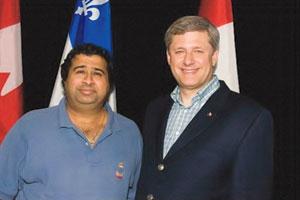You’re not really gay.
That’s a phrase that Roy Eappen hears quite a bit.
“I’m a gay Tory. That’s apparently not acceptable,” he says between giggles. “I find it kind of funny.”
Eappen is a bit of a curious case. Indian by birth, he now lives in Quebec, where he splits his time between advocating for a new centre-right consensus in the province, stumping for the federal Conservatives and hobnobbing with Republican heavyweights down south. A quick Google search will turn up pictures of Eappen alongside George W Bush, Newt Gingrich and Paul Ryan.
But he’s becoming increasingly known for his parties.
Recently, Eappen was in Tampa for the Republican National Convention, where he helped organize for conservative gay group GOProud. Before that, he started the Fabulous Blue Tent party for the Conservative convention here in Canada. “It’s a funny little secret that Tory parties all over the world are full of gay people,” he says.
Eappen’s recent 800-person party in Ottawa was met with accolades and positive reviews from partygoers and pundits. It attracted Foreign Affairs Minister John Baird, Citizenship and Immigration Minister Jason Kenney and MP Rick Dykstra, as well as staffers from all parties. Even Laureen Harper was supposed to come, but she couldn’t make it.
He laughs again. “She’s an Evangelical Christian, and she’s cool with us.”
Critics derided the party, lobbing accusations of tokenism. But Eappen shrugs it off. “When we had this party, a lot of gay bloggers went nuts,” he says. People asked him, “How can you homophobes have this party?’”
But Eappen says that gay Tories are nothing new. He’s been in the party — the Progressive Conservative side — since he was 16. He says Centre Block in Ottawa is flush with gay staffers, advisers, strategists and other Tories in positions of power. “[The party was] just to show that we’re there. We usually don’t make a big thing about it,” he says.
Some see that as a contradiction in terms. The Tories, infamously, were the main crusaders against marriage equality.
“Just because people oppose gay marriage doesn’t mean they’re homophobic,” Eappen says. “I think you can have that conversation without resorting to name calling.”
He says that the debates on gay issues can be problematic — and monolithic. “We like to see ourselves as victims,” he says. “I’m not a victim.”
While he concedes that there were homophobic aspects to the Conservative Party, he says the majority of the party is, and always has been, perfectly happy to have queer folks in the party. “We’re a big tent,” he says.
But this big tent doesn’t necessarily highlight its own diversity. “We mix with each other,” he says, snidely throwing in “unlike the Liberals.”
“I don’t get the hyphen part. I’m a gay-monarchist-Indian-Christian-Conservative.” He’s laughing again. Foremost, he says, “I’m a Canadian.”
Rather than just playing identity politics, he says, the Conservatives have delivered results.
He points to Kenney’s recent email lauding his government’s record; some people were angry that the minister mined an online petition about gay rights to get those emails. Eappen says the reaction was ludicrous. “It was an issue that people were concerned about, the government did something about it, and people got mad.”
That new focus on lesbian, gay, bisexual and trans rights as a cornerstone of Canada’s foreign and immigration policies is something to be proud of, he says, and it’s not just about getting pink votes come 2015. “They believe that we should save people from being murdered,” he says.
He says Baird highlighted this altruistic goal in front of the UN recently, as a plank of his government’s reorientation toward gay rights as one of its core issues to advance abroad, and especially in the Commonwealth. The immigration system, too, has been reworked to allow more queer refugees, Eappen says. In practice, however, activists have panned these decisions as being more in tone than substance.
But even underscoring gay rights as a tone is a big step forward. And while there have been a few discussions about appealing more to the gay voter base when the next election comes around — like Kenney’s masterful courting of immigrant communities around Toronto — it’s not exactly a priority.
Karl Baldauf says that while he’s not sure if the Tories are on the verge of a big, gay influx, the gay membership of the party has been critical in making it into the more socially moderate party he thinks it is today.
“Part of disregarding a party means they’re more inclined to disregard you,” says Baldauf, a communications consultant who has been active in Conservative politics. Baldauf has different origins than Eappen; he got his start in the late 1990s with the Reform Party in rural Ontario.
He quickly adds a caveat. “I’ve never identified as, nor am I now, a social conservative.” He says he joined the party because of its “populist roots.”
Despite some archaic views on homosexuality, Baldauf says Reform’s successor has made a long shuffle toward the broad centre on gay rights. And he shrugs off any notion that the Conservatives’ historical opponents were much better — it was Jean Chretien, after all, who was one of the leading opponents of gay marriage, he says, until he changed his mind in 2005.
If you needed evidence of the Tories’ queer shift, look no further than his government’s full-throated condemnation — perhaps one of the loudest — of a Ugandan law that, if passed, would give the state the power to execute homosexuals for their sexual orientation. That was symbolic of a maturing of the party’s position, Baldauf says.
And while there’s still some work to be done — some MPs are still against gay marriage, and much of the party is still in opposition to a proposed bill to protect rights for trans people — he says things are improving. “There’s been a constant evolution of the political class,” he says, which has mirrored the general population’s warming-up to gay rights.
For David Couturier, parliamentary affairs advisor for the deputy leader of the government in the Senate, the party already seemed evolved when he got there. “To tell you the truth, I was out to people in the party before I was out to my own family,” he says.
Couturier lives with celebral palsy, and he says his driving self-determination shaped his political beliefs. Those beliefs and ideas were always welcome in the party, he says. “I feel very lucky, because I could have been labelled as the guy in a wheelchair, the gay guy or the gay in a wheelchair, but that didn’t happen,” he says. “I think we must be really careful of labels.”
That’s become a sort of hallmark of the queer Tory movement: a fear of tokenism. While their detractors have called it shame, it’s really a modest brand of pride.
We’re here, we’re queer, and that shouldn’t really matter.
Yet while that openness has extended to much of the party, the Conservatives remain the only of the three main parties in the House without an openly gay MP.
But there have long been rumours that some Conservative MPS are in the closet. Eappen says it’s not his place to out anyone. He would, however, comment coyly on Baird, whose homosexuality is an open secret in Ottawa.
“How more out does he have to be to you guys?”


 Why you can trust Xtra
Why you can trust Xtra


